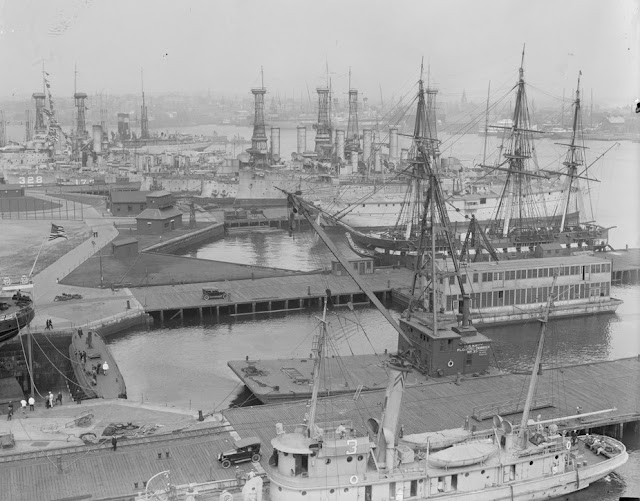Boston Longshoremen and Irish Women Protest British Ships at Charlestown Navy Yard on September 1, 1920
Photo Courtesy of Digital Commonwealth
On September 1, 1920, more than 100 dock workers at Charlestown Navy Yard boycotted British Ships in sympathy with the Boston Irish who were protesting against Britain's treatment of Ireland.
Bostonians were upset about the hunger strike of Terence MacSwiney, lord mayor of Cork, Ireland, who had been sentenced to two years in prison by British authorities. He went on a hunger strike on August 12 to protest his imprisonment and was rapidly declining in heath. He died on October 20, 1920.
Photo from Boston Globe, September 1, 1920
As longshoremen were loading the British ship Nitonian, there was picketing on the docks by two women, Mrs P. H. Savage and Miss Amelia Rosser, niece of General Thomas Rosser, according to The Boston Globe. The women were joined by Irish leader John P. McCarthy, an Irish leader, who exhorted the crowd, asking if they were going to handle British goods and telling them they must tie up British shipping."A large crowd speedily collected, the longshoremen, freight handlers and others who were through their day's work stopping to hear what the pickets had to say. John J. Lucey. president of the Robert Emmet Branch, Friends of Irish Freedom, was among those attracted, and he immediately took advantage of the gathering to deliver an address," wrote the Globe.
The sympathetic strike among the longshoreman spread to East Boston as well. Several gangs went to work this morning but by noon they had dwindled to a handful, and even these are quitting one by one, the Globe reported.
A motion to interfere only with those ships flying the English flag was discussed on the previous night at the meeting of the striking longshoremen, held at John Boyle O'Reilly Room at Hibernian Hall in Dudley Square, Roxbury.
Irish women played a prominent role in exposing British mis-rule in Ireland during the early 20th century, and numerous protests were held in Boston, New York, Washington DC and other American cities. In February 1919, a group of Boston Irish women protested the Boston visit of President Woodrow Wilson, complaining about his failure to protect Ireland as a small nation during the Paris Peace Talks, and for his failure to pass the Suffrage bill giving women the right to vote.
Research + Text, Michael Quinlin





Comments
Post a Comment